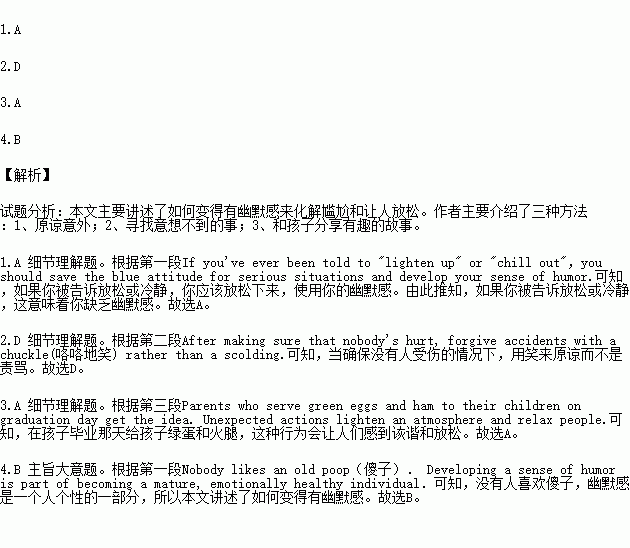题目内容
Nobody likes an old poop(傻子). Developing a sense of humor is part of becoming a mature, emotionally healthy individual. Laughter is good for the soul, builds friendships and relieves stress. It serves as the glue for social situations and as an ice-breaker for sadness and boredom. If you’ve ever been told to “lighten up” or “chill out”, you should save the blue attitude for serious situations and develop your sense of humor.
Forgive the accidental. A sudden fall is humorous not because we like to see people fall, but because it surprises. From a spilled(溢出)water glass in a meeting to Aunt Rae’s teeth coming off in the Thanksgiving turkey, the embarrassment of accidents can be relieved by humor and a helping hand. After making sure that nobody’s hurt, forgive accidents with a chuckle(咯咯地笑)rather than a scolding.
Look for the unexpected. The kid who used to look at you with his eyes closed during a test had the idea. Parents who serve green eggs and ham to their children on graduation day get the idea. Unexpected actions lighten an atmosphere and relax people.
Learn to laugh with your kids. Most of what children say and do is funny. Help them learn that accidents are sometimes funny and sometimes occasions for joining in and helping another human being. By sharing laughs and attempting to explain humor, you develop your sense of humor, as well as help kids develop their own sense of humor.
1.If you’ve ever been told to “lighten up” or “chill out”, it means ________.
A. you lack humorB. you are blue
C. you are humorousD. you are funny
2.According to Paragraph 2, when your friend falls, you can ________.
A. laugh at himB. feel embarrassed
C. scold himD. chuckle
3.In the author’s opinion, if your mother serves green eggs and ham to you on your graduation day, she is ________.
A. humorousB. seriousC. considerateD. boring
4.What is the best title for the passage?
A. Ways to Become a Healthy Individual
B. How to Develop a Sense of Humor
C. The Function of Humor
D. Proper Attitudes Toward Humor
 期末冲刺100分创新金卷完全试卷系列答案
期末冲刺100分创新金卷完全试卷系列答案

 ),并在其下面写出该加的词。
),并在其下面写出该加的词。